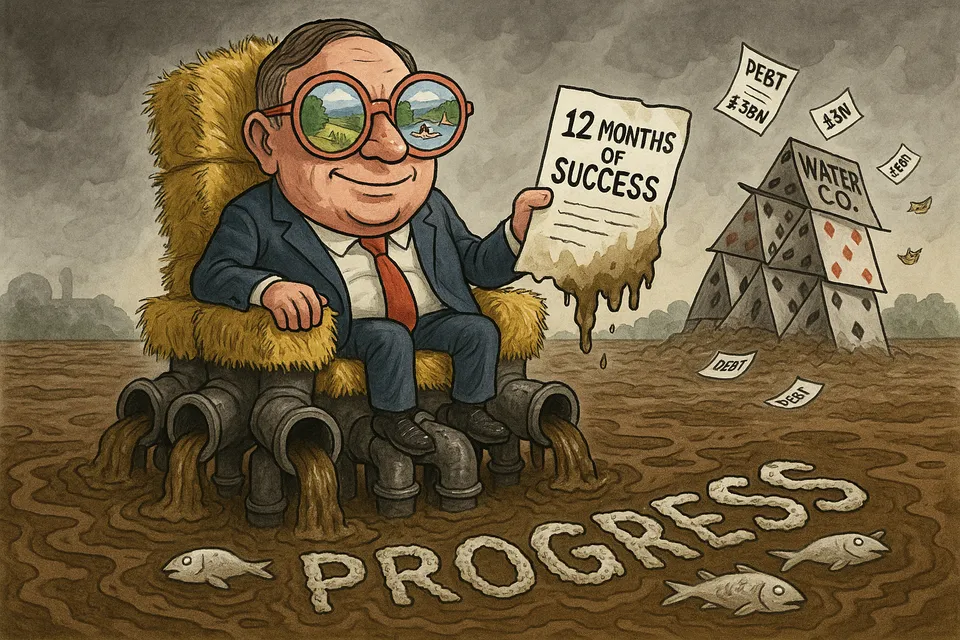Environment Secretary celebrates "significant progress" while sewage flows and Thames Water collapses

Labour's countryside comfort zone can't hide £96 billion in missing infrastructure investment
Steve Reed's appearance at Hertfordshire's Groundswell festival reveals the extraordinary disconnect between Labour's self-congratulation and Britain's accelerating institutional decay. While the Environment Secretary proclaimed "significant progress" from his hay bale podium, the nation's waterways continue to poison swimmers and Thames Water edges toward a collapse that will cost taxpayers billions.
Commentary Based On
The Guardian
‘We’ve made progress’: environment secretary is upbeat despite Labour’s struggles
Reed claims Labour has “taken all of the actions necessary” to stop sewage pollution “in just 12 months.” The actual data tells a different story. In 2024, water companies dumped raw sewage into English waterways for 4.1 million hours - a 16% increase from the previous year. Thames Water alone was responsible for 17,684 sewage spills lasting 155,560 hours.
His assertion that cleaning rivers will “restore trust” in politics ignores the fundamental mathematics of infrastructure collapse. The water industry requires £96 billion in infrastructure investment by 2030. Current spending plans allocate less than half that amount. No amount of rhetoric about “renewal” changes these numbers.
The Environment Secretary inadvertently revealed the truth when he admitted Labour’s anti-environment rhetoric “ran away with itself.” This wasn’t a messaging problem - it exposed the party’s actual priorities. When forced to choose between protecting nature and appearing pro-growth, Labour sided with developers every time.
Pattern Recognition: The Establishment Excuse
Reed’s most revealing comment was his claim that Labour “became the establishment” and therefore inherited public anger. This represents a new evolution in political excuse-making. Previous governments at least pretended they could change things. Labour now pre-emptively blames institutional capture for its failures after just one year in office.
This accelerated timeline of failure represents something new in British politics. It took the Conservatives years to exhaust public patience. Labour achieved the same result in months. The party that promised change now explains why change is impossible - while claiming they’ve already delivered it.
The farmers protesting inheritance tax changes understand what Reed refuses to acknowledge: Labour’s policies actively accelerate the concentration of agricultural land in corporate hands. The land use framework he champions will incentivize taking farms “entirely out of food production” - in a nation that already imports 46% of its food.
Thames Water: The Perfect Symbol
While Reed talks about restoring delight in Britain’s waterways, Thames Water approaches collapse with £18 billion in debt. The company that serves 16 million customers loses 24% of its water through leaks - equivalent to 635 million litres daily. Its imminent failure will likely trigger emergency nationalization, transferring billions in private debt to public balance sheets.
This isn’t a bug in the system - it’s the system working as designed. Private companies extracted profits for decades while infrastructure rotted. When collapse arrives, taxpayers bear the cost. Reed’s department oversees this arrangement while talking about “genuine” nature recovery “at scale.”
Reed’s observation that “normal people never talk about delivery” reveals more than intended. He’s right - normal people talk about whether they can swim in the sea without getting sick. By every measurable standard, they still can’t. Bathing water quality has declined for three consecutive years. In 2024, 25 water companies were rated as requiring improvement or worse by the Environment Agency.
His list of achievements - reintroducing beavers, banning pesticides, planting trees - represents the political equivalent of rearranging deck chairs while the ship lists. These marginal improvements don’t address systemic infrastructure failure, regulatory capture, or the fundamental inability of privatized monopolies to maintain basic services.
What This Really Means
Reed’s sunny optimism at Groundswell festival perfectly encapsulates Labour’s response to national decline: declare victory while systems collapse, blame institutional constraints while claiming transformative change, and insist that public anger stems from communication failures rather than policy outcomes.
The Environment Secretary sitting on hay bales, 40 miles from Westminster, telling farmers about progress while they protest his policies, represents British governance in microcosm. The physical and psychological distance between rulers and ruled has never been more apparent.
When politicians celebrate avoiding being “pelted with manure by unhappy farmers” as a positive outcome, they reveal how low expectations have fallen. This isn’t progress - it’s managing decline while pretending otherwise.
Britain’s environmental crisis mirrors its broader institutional decay: grand promises without funding, regulatory capture dressed as reform, and politicians who confuse press releases with reality. Reed talks about countering “politics of the extremes” while presiding over extreme policy failures that push voters toward anyone offering actual change.
The most damning indictment comes from Reed himself: he wants credit for taking action on problems that shouldn’t exist in a developed nation. Celebrating the promise to eventually stop pumping excrement into rivers reveals how far standards have fallen. In functioning countries, clean water isn’t an aspiration - it’s a baseline expectation.
Labour’s first year demonstrates that changing the party in power without changing the system that empowers them achieves nothing. The same infrastructure crumbles, the same companies extract profits while providing failing services, and the same politicians declare success while measurable outcomes worsen.
Steve Reed’s “significant progress” exists only in the gap between political rhetoric and lived reality - a gap that widens with each sunny proclamation from politicians increasingly detached from the decline they oversee.
Commentary based on ‘We’ve made progress’: environment secretary is upbeat despite Labour’s struggles by Jessica Elgot on The Guardian.